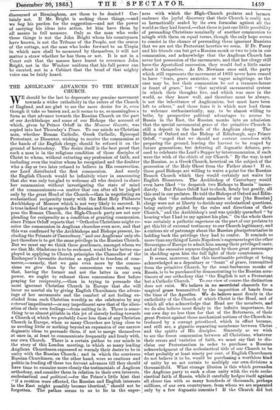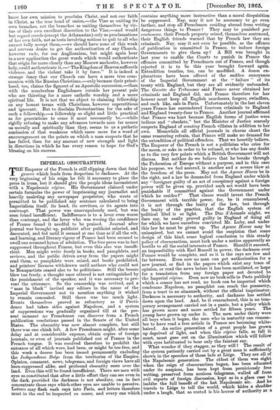THE ANGLICANS' ADVANCES TO THE RUSSIAN CHURCH.
'TE should be the last to deprecate any genuine movement
11 towards a wider catholicity in the rulers of the Church of England, and are glad to see the mere desire for it, even 'though it take so barren and, as it seems to us, so meaningless a form as that advance towards the Russian Church on the part of our Archbishops and some of our Bishops the account of -which, given by Prince Orloff in the Moscow Gazette, was copied into last Thursday's Times. To our minds no Christian man, whether Roman Catholic, Greek Catholic, Episcopal Protestant, or Dissenter, wishing to receive the communion at the hands of the English clergy, should be refused it on the ground of heterodoxy. The desire itself is the best proof that such a man is in the religious condition of those disciples of Christ to whom, without extorting any profession of faith, and including even the traitor whom he recognized and the doubter who a day or two later refused to believe in His resurrection, our Lord distributed the first communion. And surely the English Church would be infinitely wiser in announcing that she was only too glad to welcome all who desired to share her communion without investigating the state of mind of the communicants—a matter that can after all be judged only by the great Head of the Church—than in negotiating an ecclesiastical reciprocity treaty with the Most Holy Philarete Archbishop of Moscow which is not very likely to succeed. It is true indeed that as regards the Russian and Greek, and we sup- pose the Roman Church, the High-Church party are not now pleading for reciprocity as a condition of granting communion, since Prince Orloff reports that " Orthodox Christians might re- ceive the communion in Anglican churches even now, and that this was confirmed by the Archbishops and Bishops present, in- cluding the Primate of Canterbury," and our Anglicans' only ob- ject therefore is to get the same privilege in the Russian Church. But we must say we think these gentlemen, amongst whom we see that Mr. Gladstone is to be reckoned, would be far better em- ployed in applying to Church principles the Chancellor of the Exchequer's favourite doctrine as applied to freedom of com- merce,—namely, that we gain even more by the conces- sions we give than by the concessions we recede, nay that, having the former and not the latter in our own power, we ought to exhaust these concessions first before praying for reciprocity,—than in trying to persuade the most ignorant Christian Church in Europe that she will incur no mortal sin by giving English Churchmen the advan- tage of her sacraments and the comfort of not feeling ex- cluded from such Christian worship as she celebrates by any external impediment—or any impediment save that of the alien- ation of their own feelings—from uniting in it. There is some- thing to us almost pitiable in this jet of sisterly feeling towards a Church of which we probably know less than of any Christian "Church in Europe, when so many Churches are lying close to us needing little or nothing beyond an expansion of our narrow dogmatic ideas to persuade them, if not to merge themselves at once in, at least to communicate frequently and freely with, our own Church. There is a certain pathos to our minds in the story of this London meeting, in which so many leading Anglican Churchmen expressed so warmly their desire to be in unity with the Russian Church ; and in which the courteous Russian Churchmen, on the other hand, were so cautious and politic in fending off these too fervent advances till they should have time to examine more closely the testimonials of Anglican orthodoxy, and consider them in relation to their own interests, ecclesiastical and political,—for the PrinCe's little hint that " if a reunion were effected, the Russian and English interests in the East might possibly become identical," should not be forgotten. The pathos seems to us to lie in the eager-
ness with which the High-Church prelates and laymen embrace the joyful discovery that their Church is really not so hermetically sealed by its own formulas against all the world as they had feared,—that there is j ust one little possibility of persuading Christians nominally of another communion to mingle with them on equal terms, though the only hope seems to consist in the chance of persuading these ignorant Russians that we are not the Protestant heretics we seem. If Dr. Pusey and his friends can but get a Russian monk or two to join in our communion, and acknowledge that the Anglican Church has never lost possession of the sacraments, and that her clergy still have the Apostolical succession, they would feel a little easier about it themselves. As Dr. Newman once said, the party which still represents the movement of 1833 never have ceased to have " fears, grave anxieties, or vague misgivings, as the case may be, lest their communion be not a treasure-house or fount of grace," lest " that mystical sacramental system in which their thoughts live, and which was once in the world, as they know well, and therefore mast be always, is not the inheritance of Anglicanism, but must have been left to others," and these fears it is which now lead them to welcome enthusiastically, nay, to be almost willing to bribe, by prospective political advantages to accrue to Russia in the East, the Russian monks into an admission that the special sacramental grace of the primitive Church is still a deposit in the hands of the Anglican clergy. The Bishop of Oxford and the Bishop of Edinburgh, says Prince Orloff, "urged that we should not content ourselves with preparing the ground, leaving the harvest to be reaped by future generations, but deferring all dogmatic debates, pro- ceed to celebrate the Lord's Supper by intercornmttnion, if such were the wish of the chiefs of our Church." By the way, is not the Russian, as a Greek Church, heretical on the subject of the procession of the Holy Ghost from the Father alone & If so, these good Bishops are willing to waive a point for the Russian Branch Church which they would certainly not waive for English Dissenters. The Archbishop of Canterbury would even have liked "to despatch two Bishops to Russia " imme- diately. But Prince Orloff had to check, firmly but gently, all this zeal in our prelates. He told the Bishops of Oxford and Edin- burgh that "the subordinate members of our [the Russian] clergy were not at liberty to decide any ecclesiastical questions, being entirely guided by the rules and directions of their Church," and the Archbishop's zeal was quickly quenched " by hearing what I had to say against his plan." On the whole there was certainly a pathetic eagerness on the part of our prelates to get this bit of external testimony to our Church legitimacy, and a curious air of patronage about the Russian plenipotentiaries in holding back the privilege they had to confer. It reminds us more than anything of Louis Napoleon's eagerness toget the other Sovereigns of Europe to admit him among their privileged caste, and of the excessive coyness displayed by those great personages in shedding upon him the full light of their countenance.
It seems, moreover, that this inestimable privilege of being acknowledged as a depositary or "fount" of grace, transmitted from the primitive Church, by the semi-barbarous monks of Russia, is to be purchased by demonstrating to the Russian scru- tineers of our orthodoxy that " the English is not a Protestant but a Catholic Church." To our view of course the distinction does not exist. We believe in no sacerdotal channels for a magical grace transmitted by the imposition of hands from the time of the Apostles. We do believe most firmly in the catholicity of the Church of which Christ is the Head, and of which all who acknowledge that Head are the members, and we do also believe most firmly in the infinite importance, for our own day no less than for that of the Reformers, of their great Protest against those mechanical notions of the Church in- troduced by a corrupt priesthood, which in effect became, and still are, a gigantic separating membrane between Christ and the spirits of His disciples. Sincerely as we wish to see the freest communion between all Christians, whatever their errors and 'varieties of faith, we must say that to dis- claim our Protestantism in order to purchase a Russian acknowledgment of the ecclesiastical title of our Church to 'be what probably at least ninety per cent. of English Churchmen do not believe it to be, would be purchasing a worthless kind of unity by an act certain to multiply our own divisions a thousandfold. What strange illusion is this which persuades the Anglican party to such a close unity with the rude eocle- siastfc-al faith of Russia, while it carefully hedges itself against all closer ties with so many hundreds of thousands, perhaps millions, of our own countrymen, from whom we are separated only by a few dogmatic conceits I If the Church did but know her own mission to proclaim Christ, and not our 'faith in Christ, as the true bond of union,—the Vine as uniting its own branches, not the branches as uniting themselves by vir- tue of their own excellent discretion to the Vine,—and would but regard creeds (except the Athanasian) only as proclamations of her own faith, not as tests involving notices to quit to all who cannot fully accept them,—we should have none of this weak and nervous desire to get the authentication of any Church, however rude, for our Anglicanism, but might again hear in a new application the great words which would authenticate that origin far more clearly than any Moscow anchorite, however holy, could authenticate it,—" The Kingdom of Heaven suffereth violence, and the violent take it by force." It is indeed a strange fancy that our Church can have a more true com- munion with the Russian Christians,—only because their priest- hood, too, claims the figment of an Apostolic succession,—than with the numberless Englishmen outside her present pale who are thirsting for a more catholic worship and a more spiritual life. It is-not that we object to claiming fellowship on any honest terms with Christiana, however superstitious and ignorant But to disclaim Protestantism for the sake of such a fellowship, —a fellowship so slight and little practical as for generations to come it must necessarily be,—while rigidly refusing to make any advances towards men far nearer la morally and spiritually than they, seems to us a pathetic confession of that weakness which cares more for a word of encouragement on the points on which a man suspects that he has failed, than for any amount of new strength and light in directions in which he has every reason to hope for God's blessing on his success.































 Previous page
Previous page